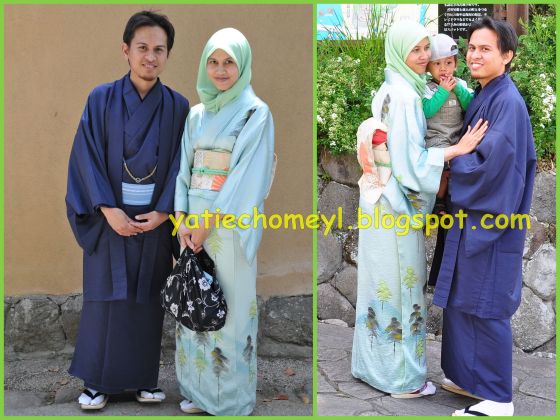This will be my special entry about our most valuable experience on wearing kimonos.
This is our first experience of wearing kimonos ever since we live in
Japan for the past 3 years.
To get the experience of wearing kimono, we went to Kitsuki Castle, located in northern west of Oita prefecture. This place is also commonly known as "Little Kyoto", which still obtains the traditional Japanese streets and stores.
To get the experience of wearing kimono, we went to Kitsuki Castle, located in northern west of Oita prefecture. This place is also commonly known as "Little Kyoto", which still obtains the traditional Japanese streets and stores.
The kimono is a Japanese traditional garment worn by women and children. The word "kimono", which literally means a "thing to wear" (ki "wear" and mono "thing"), has come to denote these full-length robes. The kimonos are available for rental at the price of 2000 yen (RM 75) for 4 hours of wearing it. You can not only choose a kimono to fit you from a wide collection, but also dressing will be fully assisted.
Kimono are T-shaped, straight-lined robes worn so that the hem falls
to the ankle, with attached collars and long, wide sleeves. Kimono are
wrapped around the body, always with the left side over the right, and
secured by a sash called an obi, which is tied at the back. Kimono are generally worn with traditional footwear (especially zori or geta) and split-toe socks (tabi).
There are many careful steps to take into consideration while wearing kimono. Basically we need kimono + obi sash + kimono slip + two towels + three koshihimo (soft ties) + datejime (belt) and obiita (stiffener). It is best to wear something (undergarment) underneath a kimono to keep it clean. Then the ladies at the kimono house, wrapped us using all those items.
Lama jugak proses yang di ambil untuk belit membelit kimono tu. I learn three important things on the right way to wear kimono which are :-
(i) lipatan depan kimono itu will always left over right
(ii) Koshihimo (soft ties) are tied tightly around the waist to maintain the right length
(iii) the collar part should be about three fingers from the back of the neck to show the back of the neck to look elegant *tapi I sumbat tudung so tak lah menampakkan leher*.
In contrast to women's kimono, men's kimono outfits are far simpler, typically consisting of five pieces, not including footwear. Men's obis are made from silk, and it were narrower, shorter and less decorative than those worn by women. The typical men's kimono is a subdued, dark color; black, dark blues, greens, and browns are common. Fabrics are usually matte. These are usually paired with white undergarments and accessories.
There are many careful steps to take into consideration while wearing kimono. Basically we need kimono + obi sash + kimono slip + two towels + three koshihimo (soft ties) + datejime (belt) and obiita (stiffener). It is best to wear something (undergarment) underneath a kimono to keep it clean. Then the ladies at the kimono house, wrapped us using all those items.
Lama jugak proses yang di ambil untuk belit membelit kimono tu. I learn three important things on the right way to wear kimono which are :-
(i) lipatan depan kimono itu will always left over right
(ii) Koshihimo (soft ties) are tied tightly around the waist to maintain the right length
(iii) the collar part should be about three fingers from the back of the neck to show the back of the neck to look elegant *tapi I sumbat tudung so tak lah menampakkan leher*.
In contrast to women's kimono, men's kimono outfits are far simpler, typically consisting of five pieces, not including footwear. Men's obis are made from silk, and it were narrower, shorter and less decorative than those worn by women. The typical men's kimono is a subdued, dark color; black, dark blues, greens, and browns are common. Fabrics are usually matte. These are usually paired with white undergarments and accessories.
Men's kimono sleeves are attached to the body of the kimono with no
more than a few inches unattached at the bottom, unlike the women's
style of very deep sleeves mostly unattached from the body of the
kimono. Men's sleeves are less deep than women's kimono sleeves to
accommodate the obi around the waist beneath them, whereas on a woman's
kimono, the long, unattached bottom of the sleeve can hang over the obi
without getting in the way.
A traditional hand-dyed silk woman's kimono may easily exceed 800 000yen (~RM 30 400);
a complete kimono outfit, with kimono, undergarments, obi, ties,
socks, sandals, and accessories. However, most kimonos owned by kimono
hobbyists or by practitioners of traditional arts are far less
expensive because they use cheaper and machine-made fabrics to made the
kimono. The one that I wore in this picture, cost about 50 000 yen (RM 2000). *perghh first time I pakai baju harga RM2000* .
Lined (awase)
kimono, traditionally made of silk but sometimes wool or synthetic
fabrics, are worn during the cooler months. Light, cotton yukata are worn by men and women during the summer months and after bathing at onsen (hot spring resorts) and ryokan (traditional inns) *contohnya macam yang kat Bukit Tinggi tu bukan KIMONO tapi YUKATA*.

Because it was unusual for the Japanese people to see foreigners like
us wearing kimonos with a scarf, some of them approach us to take our
picture.

+- SN rilek je jalan paling depan walaupun kamera DSLR muncung besar tengah di halakan kat muka dia -+
I posed for few Japanese professional photographers and became their model tak berbayar for the reasons that :-
(1) I get to introduce the beauty of wearing scarf with a kimono to those Japanese people.
(2) I always dream to be a model but I know that I am not qualified to be one, so this is like once in a lifetime opportunity for me to be photographed by a professional photographer.
(3) One of the photographer (Hirasumi-san) told me that he will send the photo to join some contests organized for professional photographers. Wooohhoooo.
(4) I loves to be in the center of attention - gila glamour
Before we undressed the kimonos, we took the chance to made our own photography session in the Japanese garden there. Masa ini, tak ada orang lain melainkan kami sahaja kat situ. Dapatlah posing sesuka hati sesedap rasa, berangan gaya 'fierceeeeeee' macam yang Tyra Banks ajar dalam America's Next Top Model
Overall, I would sum up this entry by saying --> "This is like a once-in-a-lifetime experience dealing with this Kimono stuff. And it's something that we're probably not going to forget."
## Informations are taken from: Wikipedia
Pssssttt: sesekali berangan jadi model apa salahnya?. Biasanya jadi model untuk blog sendiri je ngeeee. *jadi sila jangan hairan bila tengok banyak gila gambar dalam entry ni,
“Entri ini ditulis untuk cabaran #5 iPad MySuperKid yang direviu oleh [Nor Haryati Yahaya] dan ditaja oleh Bling Boutique”

































0 comments:
Post a Comment